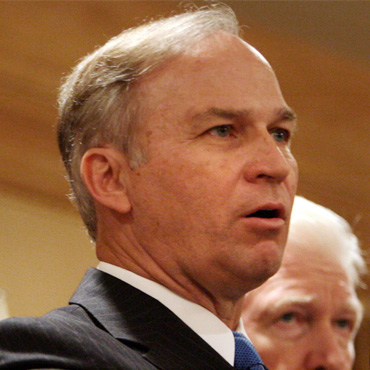Randy Forbes: Leading the fight for more military funding

Virginia Republican Randy Forbes argues that the Pentagon has absorbed far more than its share of budget cuts. But will his congressional colleagues listen?

Rep. Randy Forbes (R-Va.) is among the handful of lawmakers who have been battling the continuing assault on the nation's military budget. For now, he concedes, his prospects for success remain dim.
"The Pentagon will be forced to budget with the lower figures," Forbes told FCW. "It's difficult for many members to look in the mirror and admit that they made a mistake."
Forbes laments that the diminishing corps of military hawks in Congress has had little impact on the budget struggle. In particular, he has fought the continuing Pentagon spending reductions mandated by the Budget Control Act of 2011. Although Congress voted in December to restore $22 billion of that spending, that still leaves the Defense Department with $32 billion in cuts for fiscal 2014 and a new ceiling of $520 billion. In 2010, DOD's budget authority was $696 billion, according to the Office of Management and Budget.
The law's doomsday scenario was designed to be so draconian that lawmakers and President Barack Obama would never allow it to take effect. Instead, even with the recent tinkering, the automatic spending cuts remain alive and kicking in their third year. And because of the exemption for payroll, they are digging more deeply into the marrow of Pentagon readiness and procurement.
Forbes said national security spending had already been slashed by nearly $800 billion in Obama's first term from original projections, and the sequester is expected to add tens of billions in annual cuts. Put another way, DOD accounts for about 20 percent of non-discretionary federal spending, but it is absorbing 50 percent of the sequester cuts.
A budget Cassandra
Perhaps defense spending will get some relief when Congress works on the fiscal 2015 budget, Forbes said wistfully. In the meantime, he added that the adverse impact on the nation's military will not reveal itself in a single moment or event. Instead, he worries most about the "curve lines" that are dropping dramatically throughout the military forces.
Forbes cited a number of catastrophic results: "We need 346 ships to defend this country. We now have 284…. If we continue with the sequester, we will be down to about 230 to 240 ships.… Only 4 percent of our Army brigades are resourced and ready for combat. [Air Force] leaders will tell you that one-half of the fleet of planes would not be certified for combat.… And we are heading to doing zero modernization."
In his role as the budget Cassandra, Forbes has attacked congressional leaders of both parties for allowing the sequester to become a straitjacket on Pentagon spending. He has displayed his independence by opposing last March's House-passed budget resolution. He was one of only 10 Republicans who voted against it, but some of the others objected because they said the total spending was too high.
Other senior lawmakers -- including key players on the Armed Services and Appropriations committees -- agree with Forbes, at least in general terms, that Pentagon spending has dropped too low. But they have failed to build the requisite bipartisanship to replace the sequester, which also affects domestic spending but not entitlements such as Social Security and Medicare.
The ongoing budget negotiations have been a familiar pattern in the past three years. Republicans have stood steadfast against tax hikes while Democrats object to entitlement cuts that might offset the cuts at DOD. And neither party is willing to repeal the sequester and accept the resulting increase in the deficit, which remains at historically high levels -- $680 billion in fiscal 2013 -- despite falling by half since a record $1.4 trillion four years earlier.
In its never-ending budget gamesmanship, Congress faces a Jan. 15 deadline for extending the current spending bill, which was largely a status quo extension from the previous year. Republican leaders have insisted they will not be part of another federal shutdown.
Beyond spending issues
Forbes, a resident of Chesapeake near the sprawling Navy facilities in the Tidewater area, is deeply familiar with the implications of the budget cuts. Many of his constituents work at the facilities, though few are actually in his district, which extends north to the suburbs west of Richmond and west to rural "southside" Virginia.
Instead, he said his work as a senior member of the House Armed Services Committee and chairman of its Seapower and Projection Forces Subcommittee is what has triggered his concerns about the consequences of the steep military spending cuts.
"My No. 1 goal is the defense of the United States of America," he said. "No one can argue I'm doing this for my district."
Forbes entered the House in 2001 by winning a special election for a seat long held by conservative Democrats. Since then, he has made his seat safely Republican, with some helpful redistricting tweaks by the Virginia legislature. If anything, his re-election challenge could come from a Tea Party primary candidate accusing Forbes of being a big spender.
"My district can be split on some of these issues," he conceded.
On the Armed Services Committee, Forbes has sought to extend his work beyond spending issues. He recently took charge of a review of U.S. military activities in Asia and the Pacific region. With a bipartisan and policy-driven review that committee members have said is consistent with the panel's long traditions, they have sought to offer insight and possible encouragement for Obama's much-touted pivot to focus on Asia -- especially the growing dominance of China.
"It's an excellent opportunity to build on the positive relationships we have in that area…to make that relationship [with China] work," said Rep. Adam Smith (D-Wash.), who is the committee's ranking member.
But Forbes, who has shown a long-standing interest in the threat posed by China, warned that the Pentagon's spending woes will limit the potential impact of U.S. intentions to rebalance its overseas priorities.
"I give the president good marks because the rhetoric was needed…but the resources to make the rhetoric have some meaning have not happened," Forbes said. "Our allies and our competitors in the area see that we are not spending money on defense."
Leadership prospects
His interest in the committee's broader activities and his willingness to criticize party leaders for their handling of the budget have become all the more timely because of the prospect that House Republicans' term-limits rule for committee chairmen will force Rep. Buck McKeon (R-Calif.) to step down at the end of 2014.
The scuttlebutt inside the committee and among industry lobbyists is that Rep. Mac Thornberry (R-Texas) is the front-runner to become the next chairman. But Thornberry, who has made two unsuccessful bids to lead House committees, has been criticized by some as not sufficiently active in Republican political or other leadership activities.
Forbes, who earlier served as chairman of the Virginia Republican party and gave a boost to Majority Leader Eric Cantor (R-Va.) when he first ran for Congress in 2000, has downplayed public speculation about his ambitions. "I don't have the time" to focus on the chairmanship, he said, though he did not rule out making a bid for it.
However, given the uncertainty about the current House GOP leadership team, the continuing budget conflicts could influence Forbes' prospects for the top committee post.
NEXT STORY: Longtime GSA IT official calls it a day


